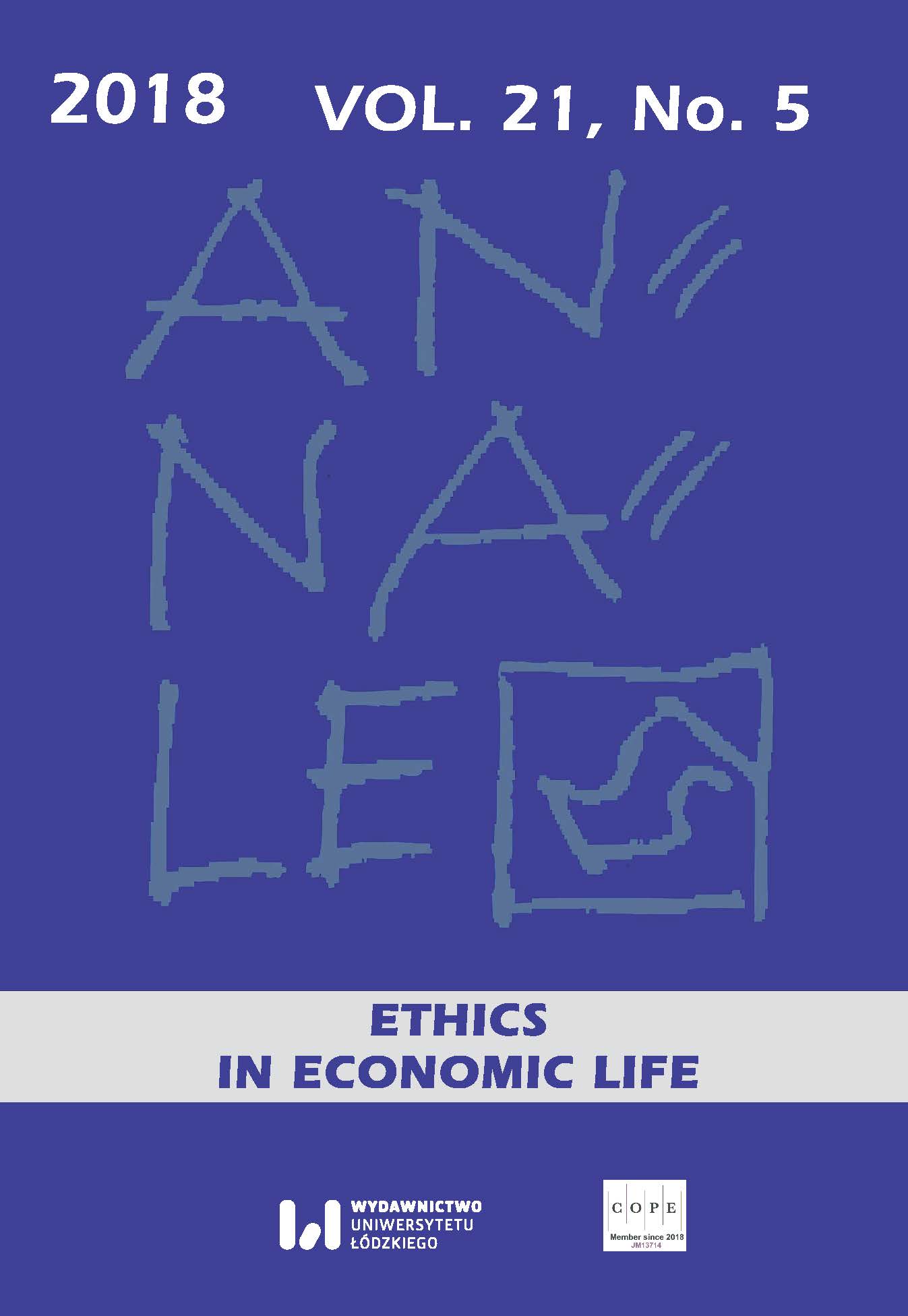The ageing of society in the context of dominant assumptions of contemporary economics and culture
DOI:
https://doi.org/10.18778/1899-2226.21.5.02Słowa kluczowe:
ageing, pensioners, sociodemographic shifts, cultural context, economic thoughtAbstrakt
Current demographic trends indicate that the process of ageing is more and more advanced in Western societies. While the available literature addressing this issue concentrates most often on developing effective tools for socio-economic policy, this paper aims at exploring the dominating assumptions of economics and culture to find how they may influence the demographic process that was mentioned. The purpose of the analysis undertaken here is to verify the thesis which claims that basic anthropological assumptions present in neoclassical economics and modern culture somehow ignore or underestimate such essential aspects of human life as old age and the helplessness or weakness connected with it. The conclusions of the paper indicate that there is a need for intergenerational balance within society, which, e.g., facilitates socio-economic development. Some of the most important factors influencing this may or may not be present within the economic theory and culture it is based on. It means that without the adequate vision of man and the phases of human life, the process of building a mentally healthy and vibrant society where everyone has his or her place is hardly possible.
Bibliografia
Barber, B. R. (2009). Skonsumowani. Jak rynek psuje dzieci, infantylizuje dorosłych i połyka obywateli. Warszawa: Warszawskie Wydawnictwo Literackie Muza SA.
Google Scholar
Beck, U. (2002). Społeczeństwo ryzyka. W drodze do innej nowoczesności. Warszawa: Wydawnictwo Naukowe Scholar.
Google Scholar
Bellah, R. N., Madsen, R., Sullivan, W. M., Swidler, A., & Tipton, S. M. (1996). Habits of the heart: Individualism and commitment in American life. Berkeley–Los Angeles–London: University of California Press.
Google Scholar
Berger, P. L., & Luckmann, T. (2010). Społeczne tworzenie rzeczywistości (J. Niżnik, Trans.). Warszawa: Wydawnictwo Naukowe PWN.
Google Scholar
Black, E. (2004). Wojna przeciw słabym. Eugenika i amerykańska kampania na rzecz stworzenia rasy panów. Warszawa: Warszawskie Wydawnictwo Literackie MUZA SA.
Google Scholar
Bruni, L. (2008). Reciprocity, altruism and the civil society. New York: Routledge.
Google Scholar
Buttiglione, R. (2005). Etyka wobec historii. Lublin: Towarzystwo Naukowe Katolickiego Uniwersytetu Lubelskiego.
Google Scholar
Castells, M. (2007). Społeczeństwo sieci. Warszawa: Wydawnictwo Naukowe PWN.
Google Scholar
Chmielecki, A. (1999). Rzeczy i wartości. Humanistyczne podstawy edukacji ekonomicznej. Warszawa: Wydawnictwo Naukowe PWN.
Google Scholar
Delsol, Ch. (2006). The unlearned lessons of the twentieth century: An essay on late modernity. Wilmington: ISI Books.
Google Scholar
Gilder, G. (1993). Wealth and poverty. San Francisco: ICS Press.
Google Scholar
Golinowska, S. (2008). Społeczno-ekonomiczne konsekwencje starzenia się ludności. In J. Kleer (Ed.), Konsekwencje ekonomiczne i społeczne starzenia się społeczeństwa. Warszawa: Komitet Prognoz “Polska 2000 plus” przy Prezydium PAN.
Google Scholar
Huntington, S. P. (2000). Cultures count. In L. E. Harrison, & S. P. Huntington (Eds.), Culture matters. How values shape human progress. New York: Basic Books.
Google Scholar
Jurek, Ł. (2012). Ekonomia starzejącego się społeczeństwa. Warszawa: Difin.
Google Scholar
Knight, F. (1951). The ethics of competition. New York: Augustus M. Kelley.
Google Scholar
Krzysztofek, K. (1991). Cywilizacja: dwie optyki. Warszawa: Instytut Kultury.
Google Scholar
Lompart, A. (2007). Imperializm ekonomiczny – czy zagraża socjologii? In J. Kochanowicz, S. Mandes, & M. Marody (Eds.), Kulturowe aspekty transformacji ekonomicznej. Warszawa: Instytut Spraw Publicznych.
Google Scholar
Michalski, M. A. (2017). Starzenie się społeczeństwa w kontekście dominujących założeń współczesnej ekonomii i kultury. Annales. Ethics in Economic Life, 20(3), 21–36.
Google Scholar
Morawski, W. (2001). Socjologia ekonomiczna. Problemy. Teoria. Empiria. Warszawa: Wydawnictwo Naukowe PWN.
Google Scholar
Morse, J. R. (2001). Love & economics: Why the laissez-faire family doesn’t work. Dallas: Spence Publishing Company.
Google Scholar
Nowak, S. (2007). Metodologia badań społecznych. Warszawa: Wydawnictwo Naukowe PWN.
Google Scholar
Samuelson, R. J. (2003, November, 3). Adventures in agelessness. Newsweek.
Google Scholar
Sobczyk, J. R. (2008). Historia naturalna homo oeconomicus – od narodzin po cywilizacyjny kryzys współczesności. In S. Partycki (Ed.), Kultura a rynek. Lublin: Wydawnictwo KUL.
Google Scholar
Stankiewicz, W. (1998). Historia myśli ekonomicznej. Warszawa: Polskie Wydawnictwo Ekonomiczne.
Google Scholar
Szczepański, J. (1980). Sprawy ludzkie. Warszawa: Czytelnik.
Google Scholar
Throsby, D. (2010). Ekonomia i kultura. Warszawa: Narodowe Centrum Kultury.
Google Scholar
Toffler, A., Toffler, H. (2007). Rewolucyjne bogactwo. Przezmierowo: Wydawnictwo Kurpisz SA.
Google Scholar
Zaidi, A. (2008). Well-being of older people in ageing societies. Aldershot: Ashgate.
Google Scholar
Pobrania
Opublikowane
Jak cytować
Numer
Dział
Licencja
Prawa autorskie (c) 2018 Annales. Etyka w Życiu Gospodarczym

Utwór dostępny jest na licencji Creative Commons Uznanie autorstwa – Użycie niekomercyjne – Bez utworów zależnych 4.0 Międzynarodowe.









